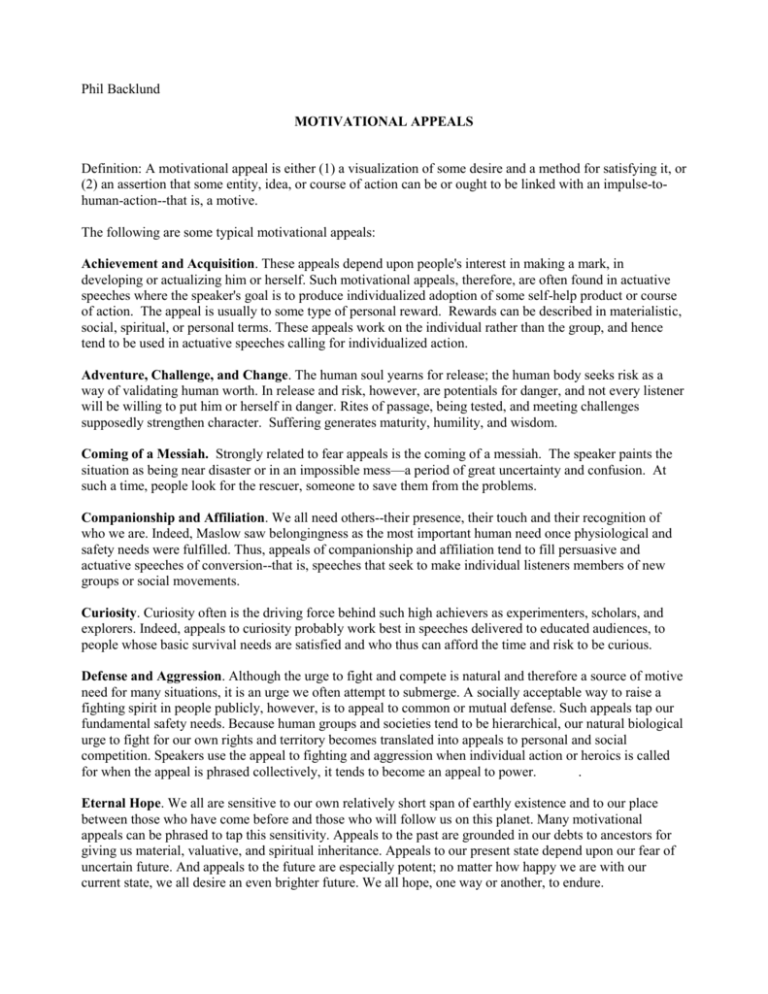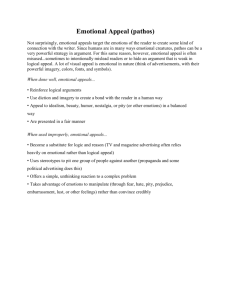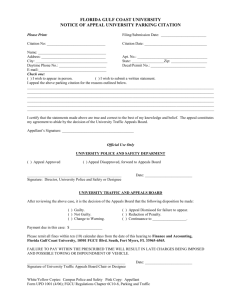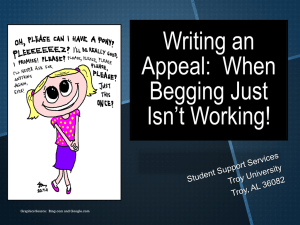motivational appeals
advertisement

Phil Backlund MOTIVATIONAL APPEALS Definition: A motivational appeal is either (1) a visualization of some desire and a method for satisfying it, or (2) an assertion that some entity, idea, or course of action can be or ought to be linked with an impulse-tohuman-action--that is, a motive. The following are some typical motivational appeals: Achievement and Acquisition. These appeals depend upon people's interest in making a mark, in developing or actualizing him or herself. Such motivational appeals, therefore, are often found in actuative speeches where the speaker's goal is to produce individualized adoption of some self-help product or course of action. The appeal is usually to some type of personal reward. Rewards can be described in materialistic, social, spiritual, or personal terms. These appeals work on the individual rather than the group, and hence tend to be used in actuative speeches calling for individualized action. Adventure, Challenge, and Change. The human soul yearns for release; the human body seeks risk as a way of validating human worth. In release and risk, however, are potentials for danger, and not every listener will be willing to put him or herself in danger. Rites of passage, being tested, and meeting challenges supposedly strengthen character. Suffering generates maturity, humility, and wisdom. Coming of a Messiah. Strongly related to fear appeals is the coming of a messiah. The speaker paints the situation as being near disaster or in an impossible mess—a period of great uncertainty and confusion. At such a time, people look for the rescuer, someone to save them from the problems. Companionship and Affiliation. We all need others--their presence, their touch and their recognition of who we are. Indeed, Maslow saw belongingness as the most important human need once physiological and safety needs were fulfilled. Thus, appeals of companionship and affiliation tend to fill persuasive and actuative speeches of conversion--that is, speeches that seek to make individual listeners members of new groups or social movements. Curiosity. Curiosity often is the driving force behind such high achievers as experimenters, scholars, and explorers. Indeed, appeals to curiosity probably work best in speeches delivered to educated audiences, to people whose basic survival needs are satisfied and who thus can afford the time and risk to be curious. Defense and Aggression. Although the urge to fight and compete is natural and therefore a source of motive need for many situations, it is an urge we often attempt to submerge. A socially acceptable way to raise a fighting spirit in people publicly, however, is to appeal to common or mutual defense. Such appeals tap our fundamental safety needs. Because human groups and societies tend to be hierarchical, our natural biological urge to fight for our own rights and territory becomes translated into appeals to personal and social competition. Speakers use the appeal to fighting and aggression when individual action or heroics is called for when the appeal is phrased collectively, it tends to become an appeal to power. . Eternal Hope. We all are sensitive to our own relatively short span of earthly existence and to our place between those who have come before and those who will follow us on this planet. Many motivational appeals can be phrased to tap this sensitivity. Appeals to the past are grounded in our debts to ancestors for giving us material, valuative, and spiritual inheritance. Appeals to our present state depend upon our fear of uncertain future. And appeals to the future are especially potent; no matter how happy we are with our current state, we all desire an even brighter future. We all hope, one way or another, to endure. Eternal Return. People appear to yearn for and often reenact a periodical return to the “good old days,” a time when things were perfect and harmonious; things could be shaped and molded as they were meant to be. Included in this is the idea that society has lost its way, and we must find our way back if we are to rid ourselves of the corruption, misplanning, and confusion that have developed since then. Fear. Humans have a broad range of fears. Fear is powerful, and produces both good and evil. Its power has made the appeal to fear one of the most common motivational appeals in advertising. Be careful, however, in your use of fear appeals, making sure that (1) you don't transgress the bounds of ethics and good tastes, and, more practically, (2) you don't make your fear appeals so strong that they actually have an opposite effect (called the "boomerang effect"). Independence and Autonomy. These draw their force from our struggles to stand apart from others. Especially when persuaders are attempting to separate you as an individual from a reference group--from the pressure of conformity--they will make this appeal. Loyalty. Periodically we all need to celebrate our membership in groups and societies so as to renew our commitments to them and increase our sense of group and social cohesiveness. Appeals to loyalty are used little in speeches attempting to change fundamental beliefs, values, or actions; rather, they are typical appeals to the like-minded--to those who already believe or value, and who habitually do act in "correct" ways. Such appeals thus are typical of what are called reinforcement speeches. Personal Enjoyment. Appeals to personal enjoyment depend on our selfish instincts. While we often act as group members, at least as often we will take some course of action because it promises us personal comfort and luxury, aesthetic enjoyment, recreation and rest, relief from home and work constraint, just plain fun, or any number of other personal pleasures. The pleasure principle may not be as strong as the pain principle and hence more people probably can be driven to action by fear than by its counterpart. But especially when listeners view themselves as individuals—this motivational appeal works well. Power, Authority, and Dominance. The appeal to power, authority, or dominance depends for its potency upon our sense of aggressiveness. But unlike the appeal to fighting, this appeal moves beyond mere winning to control. People with power and authority control objects or other people. The appeal to power depends upon your willingness to see yourself as somehow larger or more potent than you now are; therein lies its motivational effectiveness. Possibility of Success. Many novels have been written about the person who, through hard work, sincerity, honesty, and faith in the future was able to make good. This has appeal to the immigrants, the poor, the downtrodden. If you work hard, and according to advertisers, have the right things, you will succeed. Presence of Conspiracy. We tend to believe that big problems do not have simple causes—something that has been called the paranoid style. This is the belief that when problems appear great, the only reasonable explanation is that a powerful group has conspired to cause them. Various groups have blamed other groups for all sorts of ills--also known as scapegoating. A variation of this point is also the “mob at the gates.” Pride. Appeals to pride--a sense of our own or our group's worth--can drive us to collective or individual achievement. Such appeals tighten one's loyalties to groups and, when coupled with appeals to adventure, creativity, and/or independence, they move individuals to great personal exertion. Hence actuative speeches calling for extra measures of effort from audiences often contain appeals to pride. Reverence or Worship. A sense of reverence or worship leads to submission. Such reverent submission can take three forms: hero worship, reverence for institutions, and divine worship, conceived of either religiously or philosophically. As a speaker; you have comparatively limited power to create a sense of reverence in your listeners, but, if you know enough about your listeners ahead of time, you can draw upon references to objects, people, or institutions they are likely to revere. Revulsion. In symbolic terms, you can visualize in strong images objects of disgust or loathing. Beware that you don't make such descriptions so gruesome that your appeal to revulsion turns them away in disgust; here, too, watch for the boomerang effect. Sexual Attraction. The core of the appeal 1ies not so much in bodily functions per se as in a more general idea of personal attractiveness and, in some cases, secret yearning and adventure. Advertising agencies usually let pictures offer the sexual images directly, reinforcing them with indirect verbal enticements. As a speaker, you, too, are well advised to keep your sex appeals phrased in indirect language so as not to offend some listeners while yet reaching others' concern for personal attractiveness. Sympathy and Generosity. We know that, on many occasions, we all can be shamed or drawn to reach out for others. All appeals to giving, to support for others, and to self-sacrifice in the name of the common good are based on the assumption that your social self (that part of you bonded to others) will overcome your private self (that part of you which is self-centered) when the right appeal is made. Appeals for public generosity depend in part, of course, on our sense of conformity, but also in part on our sense that we, too, would want help were we in need or trouble. Sympathy is a powerful appeal, often the heart of fund-raising speeches. Tradition. The appeal to tradition is closely associated with appeals to endurance. It depends upon one's sense of temporality--the past's relationships to the present and future. Tradition also is related to appeals to loyalty--loyalty to one's roots, nurturing institutions, and family. Nevertheless, tradition also can be considered a unique motivational appeal, because it operates psychologically in a different way from its cousins. "Endurance" stretches your mind into the future, while tradition draws your thoughts back to the people and the ideas which have formed you, given you strength and a sense of self-identity, and drawn you into a community with other like-minded people. The appeal to tradition psychologically produces a direct identification between you and the institution or person being called up. Wisdom of the Rustic. No matter how devious the opposition, the simple wisdom of the backwoods wins out. We believe in humble beginnings, or failing that, lots of adversity. At the same time, we devalue the intellectual or the educated. The intellectual is often the brunt of jokes, and the rustic often wins out over the smart guy. Adapted from a variety of sources.






